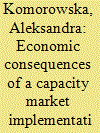| Srl | Item |
| 1 |
ID:
176859


|
|
|
|
|
| Summary/Abstract |
This paper investigates the potential economic consequences of setting up a capacity market in Poland. A computable model of the Polish power generation system is developed and employed to analyse the impact of this mechanism. Two scenarios are designed for this study: (i) a reference scenario that reflects the energy-only market and (ii) a capacity market scenario that assumes the implementation of such an instrument. To assess the economic consequences, the following parameters are estimated: (i) annual electricity prices, (ii) Loss Of Load Hours, (iii) Expected Energy Not Served, and only for the capacity market scenario: (iv) market clearing price, (v) total budget of the capacity market, and (vi) increase in electricity price due to the introduction of the capacity market. The findings of the study indicate that the long-term maintenance of the energy-only market results in higher electricity prices when compared to putting a capacity market into operation. Introducing a capacity market enables existing resources to be used effectively without excessive capital expenditure. The methods and conclusions presented in this paper provide valuable findings and policy insights regarding the potential economic consequences of a capacity mechanism in a power system mostly dominated by coal and undergoing an energy transition.
|
|
|
|
|
|
|
|
|
|
|
|
|
|
|
|
| 2 |
ID:
191163


|
|
|
|
|
| Summary/Abstract |
As broadly understood, capacity markets are the instruments introduced to secure capacity adequacy in power systems. They are usually introduced to ensure sufficient incentives for investors to maintain optimal capacity when the energy-only markets fail. However, although this mechanism should be technologically neutral, it is important to learn how the substantial funds transferred from consumers are allocated. With this in mind, this study analyses capacity auction results and provides evidence-based findings on the spending of capacity market funds. To achieve this research objective, the Polish capacity market is taken as an example of a capacity market introduced in a power system heavily dependent on fossil fuels and undergoing slow decarbonisation. The analysis covers six auctions for the 2021–26 delivery years. The results show that the key beneficiaries are coal units to which, on average, over 67% of the total budget is allocated. They will receive EUR 412–917 million/year in the period analysed. Capacity markets should increase competitiveness and create incentives; however, the evidence from Poland indicates that it mainly supports the existing, high-emission units operating within state-owned companies. Although the study is conducted for Poland, the findings provide sound lessons for other countries considering the introduction of a capacity market.
|
|
|
|
|
|
|
|
|
|
|
|
|
|
|
|